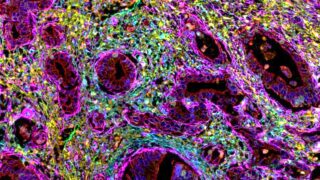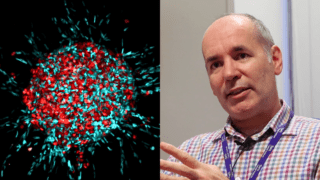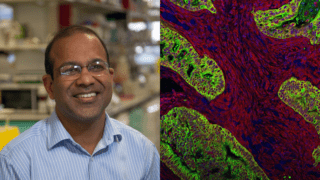Tag: Pancreas
Search News
Categories
Archives
New spinout launches to advance early pancreatic cancer detection
29th October 2025
Queen Mary University of London has launched a new company, Procyon Diagnostics, to provide pioneering early cancer detection tests. The company’s first test, PancRISK, offers new hope for detecting pancreatic cancer earlier, building on over 15 years of research by Professor Tatjana Crnogorac-Jurcevic at Queen Mary’s Barts Cancer Institute (BCI), funded by the Pancreatic Cancer Research Fund.
Read morePancreatic Cancer Research Fund Tissue Bank achieves landmark international accreditation
19th August 2025
The Pancreatic Cancer Research Fund Tissue Bank (PCRFTB) has become the first in England to receive ISO 20387:2018 accreditation, an international standard that recognises excellence in biobanking.
Read moreScientists explore new way to bring CAR-T cell therapy to pancreatic cancer
22nd May 2025
A new strategy to help powerful cancer-targeting immune cells, known as CAR-T cells, infiltrate pancreatic tumours has been developed by researchers at Barts Cancer Institute, Queen Mary University of London. The unique three-pronged approach could pave the way for making CAR-T cell therapy—a treatment that has transformed care for certain blood cancers—effective against pancreatic cancer, a disease that remains very difficult to treat.
Read moreHow non-cancerous cells in pancreatic cancer may weaken the immune system’s response
12th December 2024
New research sheds light on how certain non-cancerous cells in pancreatic cancer can affect the body’s natural immune defences and could have a significant impact on patients’ survival.
Read moreVideo: mini-tumours shed light on how pancreatic cancer spreads
19th December 2023
We spoke to Professor Richard Grose about his lab’s latest study, which uses mini-tumours to understand how pancreatic cancer coerces normal cells to help it spread to other tissues. The new paper has been featured on the cover of the latest issue of the Journal of Pathology.
Read moreWorld Pancreatic Cancer Day: research reveals molecules that alter the disease’s spread
16th November 2023
‘Star-shaped’ cells in the pancreas emit molecules that alter the tumour’s aggressiveness
Read more





